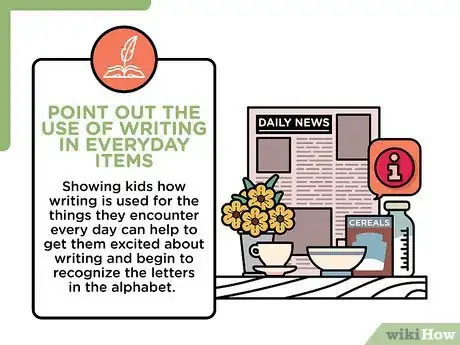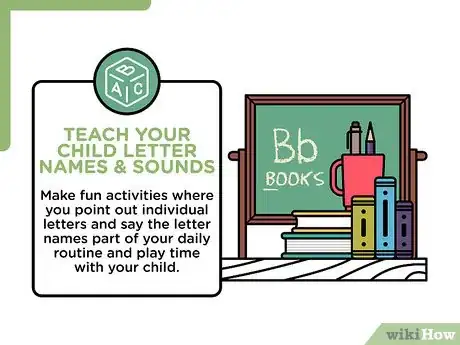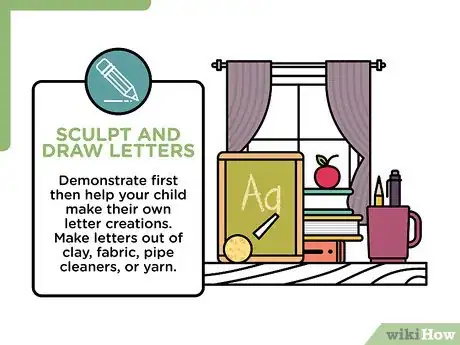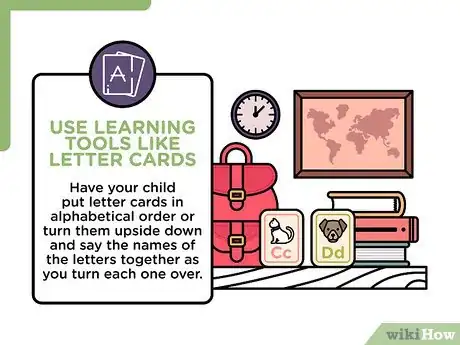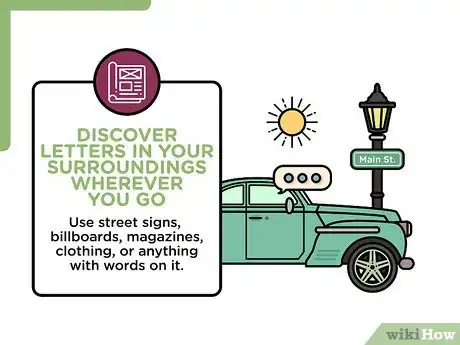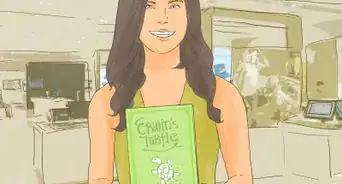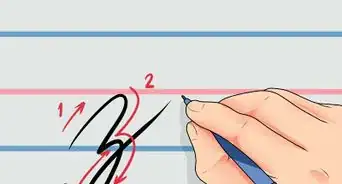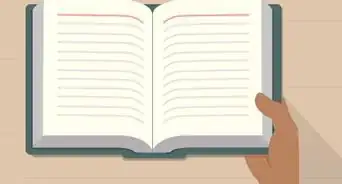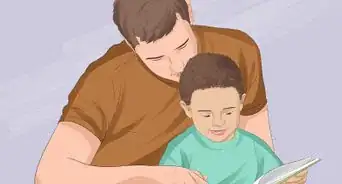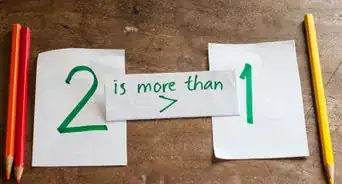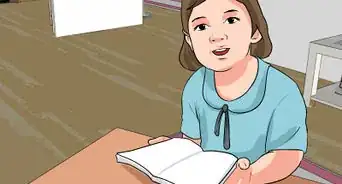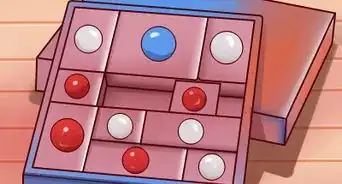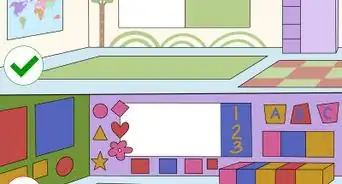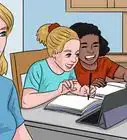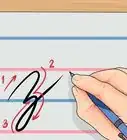This article was co-authored by Sylvia Rath. Sylvia Rath is a Parenting Specialist and the Director of Little Village Nursery School in Los Angeles, California. With over 30 years of experience, Sylvia guides parents through the preschool years and beyond by teaching respectful communication and positive discipline methods. Sylvia holds a BA in Psychology and Early Child Development from Antioch University. Before working at Little Village Nursery School, she taught preschool for eight years.
There are 8 references cited in this article, which can be found at the bottom of the page.
This article has been viewed 217,801 times.
You can prepare your child for success in kindergarten and beyond by helping them learn to recognize the letters of the alphabet. Recognizing letters is a basic literacy skill. Before they can learn to read, children must recognize and know their letters and know what sounds they make. You can help set the stage for success.
Steps
Creating a Language-Rich Environment
-
1Make reading fun. Reading readiness starts at home, so have a blast exploring stories with your little one. It’s also a great bonding experience for the whole family.
- Use different voices for characters and animals, make your own sound effects, and make exaggerated expressions when you’re reading a story together.[1]
- End the day by reading together. After bath time and getting PJs on, make it a habit let your child pick out a few books and snuggle on the couch together while you read. You can go back to favorites again and again and rotate in new stories.
- Let your child make up their own stories to go along with pictures in a book they like. It doesn’t matter if it’s the real story, just let them be creative and use their imagination.[2]
-
2Point out the use of writing in everyday items. Showing kids how writing is used for the things they encounter every day can help to get them excited about writing and begin to recognize the letters in the alphabet. Point out how writing is used on billboards, menus in restaurants, packaging for their favorite foods, TV shows and movies, and anywhere else that you notice writing that might interest your child.Advertisement
-
3Create a reading and writing center. A designated corner with a bean bag chair or a child-sized table can become a special nook for relaxing and exploring.
- Purchase children’s books and magazines and arrange them on a shelf or in bins.
- If you are on a budget, use your public library or scour second-hand sales and thrift stores for inexpensive books. Baby shower gifts, swaps, and hand-me-downs from friends whose kids have grown out of books are also great.[3]
- Provide writing tools like pencils, markers, crayons, and different types of paper for your child to experiment with. [4]
Introducing Letter Names and Sounds
-
1Display the alphabet in different forms in your home. Kids will be excited to play with letters in different textures and sizes.
- Purchase sets of foam and magnetic letters, letter cards, and letter blocks and have them easily accessible for your child to touch, move around, sort, and arrange. [5]
- Make letters yourself out of popsicle sticks, sandpaper, Styrofoam, or other craft supplies if you’re on a budget.
-
2Teach your child letter names and sounds using the materials you have collected.[6] Make fun activities where you point out individual letters and say the letter names part of your daily routine and play time with your child.
- Toss two or three foam letters at a time into the tub with your child at bath time. While your child plays in the bath, call out each letter by name. For example, for the letter B say: "The B is tickling your toes. Oh, the B is swimming around you. Give Mommy the B." Do this activity, using different letters each time, until your child has learned all of the letters of the alphabet and can call them by name.
- Make towers, houses, and other structures with alphabet blocks, pointing out the letters on the blocks and calling them by name. [7]
- Arrange magnetic letters on the refrigerator or white board. Allow your child to experiment with them, putting them in alphabetical order, or sing the alphabet song together and point to each letter as you say its name. [8]
-
3
Reinforcing What Your Child Has Learned
-
1Play games to help your child remember and recognize letters. Playing is one of the ways young children learn best, and it’s also great entertainment.
-
2
-
3Discover letters in your surroundings wherever you go. Use street signs, billboards, magazines, clothing, or anything with words on it.
- Play a game of “I Spy” and find letters and objects that begin with letter sounds your child knows.[15]
- Point out stop signs, exit signs, golden arches, and other familiar signs and talk about what they mean. Kids can learn to “read” the meanings of these objects before they can actually read the words.
Expert Q&A
Did you know you can get expert answers for this article?
Unlock expert answers by supporting wikiHow
-
QuestionShould I teach my child additional letters of the alphabet?
 Catherine Palomino, MSCatherine Palomino is a former Childcare Center Director in New York. She received her MS in Elementary Education from CUNY Brooklyn College in 2010.
Catherine Palomino, MSCatherine Palomino is a former Childcare Center Director in New York. She received her MS in Elementary Education from CUNY Brooklyn College in 2010.
Master's Degree, Elementary Education, CUNY Brooklyn College
-
QuestionHow do you teach a child to recognize two letter word?
 Catherine Palomino, MSCatherine Palomino is a former Childcare Center Director in New York. She received her MS in Elementary Education from CUNY Brooklyn College in 2010.
Catherine Palomino, MSCatherine Palomino is a former Childcare Center Director in New York. She received her MS in Elementary Education from CUNY Brooklyn College in 2010.
Master's Degree, Elementary Education, CUNY Brooklyn College It’s great you want to teach a child to recognize two letter words. After your child is familiar with the sounds of letters they can begin to blend these sounds by working on a few commonly found two letter phonics words. You can always make this practice into a fun game. Other two letter words are known as “sight words” and have to be memorized, you can search for basic sight words, some examples are “am”, “to”, “is”, “so”. Make flashcards of these words and practice them often with your child.
It’s great you want to teach a child to recognize two letter words. After your child is familiar with the sounds of letters they can begin to blend these sounds by working on a few commonly found two letter phonics words. You can always make this practice into a fun game. Other two letter words are known as “sight words” and have to be memorized, you can search for basic sight words, some examples are “am”, “to”, “is”, “so”. Make flashcards of these words and practice them often with your child. -
QuestionHow do I determine how many letters a particular child recognizes?
 Community AnswerAsk the child to sing the alphabet or write the letters out on cards. Quiz the child and put the ones he or she knows into a pile to count.
Community AnswerAsk the child to sing the alphabet or write the letters out on cards. Quiz the child and put the ones he or she knows into a pile to count.
Warnings
- Be patient and avoid comparing your child to others. Remember that children learn at different paces.⧼thumbs_response⧽
Things You'll Need
- Foam letters
- Magnetic letters
- Letter blocks
- Clay, yarn, pipe cleaners, fabric, and other materials
- Letter cards
References
- ↑ http://www.readingrockets.org/article/25-activities-reading-and-writing-fun
- ↑ http://www.readingrockets.org/article/25-activities-reading-and-writing-fun
- ↑ http://thencbla.org/education/parent-handbook/creating-a-home-library-for-your-family-on-a-limited-budget/
- ↑ http://www2.ed.gov/teachers/how/early/teachingouryoungest/page_pg10.html
- ↑ http://www2.ed.gov/teachers/how/early/teachingouryoungest/page_pg10.html
- ↑ Sylvia Rath. Parenting Specialist. Expert Interview. 19 May 2021.
- ↑ http://www2.ed.gov/teachers/how/early/teachingouryoungest/page_pg10.html
- ↑ http://www2.ed.gov/teachers/how/early/teachingouryoungest/page_pg10.html
- ↑ https://www.reading-tutors.com/tips/TH_Tips_Alphabet.pdf
- ↑ http://www.education.com/magazine/article/kindergarten-readiness-secrets/
- ↑ http://www2.ed.gov/teachers/how/early/teachingouryoungest/page_pg10.html
- ↑ https://www.reading-tutors.com/tips/TH_Tips_Alphabet.pdf
- ↑ https://www.reading-tutors.com/tips/TH_Tips_Alphabet.pdf
- ↑ https://www.reading-tutors.com/tips/TH_Tips_Alphabet.pdf
- ↑ https://www.scholastic.com/ispy/parentsteachers/activities.htm
About This Article
To teach your child to recognize the letters of the alphabet, snuggle up and read with them every day. Play together with clay or pipe cleaners to form letters, and make sure you say each letter by name and make its sound. You can also try making up a game to play together when you’re at the grocery store, since games help kids learn and remember things. You could challenge them to see who can find all 26 letters! Read on for more ways to create a language-rich environment, introduce letter names and sounds, and reinforce what’s been learned!

